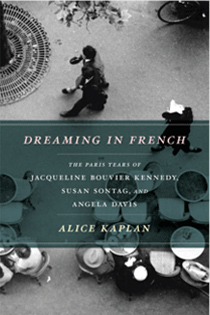By Richard M. Berrong
Americans have been traveling to Paris as long as there have been Americans. Some have hated it. Some have enjoyed it as they enjoyed other travel destinations. The lucky ones have been transformed by it in ways that no other city can duplicate.
In certain cases, the ones everyone knows, those transformed have sung the city and its effects in works that have shaped its image in our culture as a place capable of bringing out the best, the most creative, or the repressed in us to an extent that we could not have reached here at home. Paris does not always endow even its lucky ones with such abilities or desires, however.
Fortunately, sometimes there are gifted historians who can make up for that. Such is Alice Kaplan, who in her thoroughly enjoyable new book, Dreaming in French, shows us what a year or so in Paris did for three very different young American women. Bouvier came from a once prosperous East Coast family that had fabricated a myth of Old-World noble ancestry but, with the financial failure of her father and her parents’ subsequent divorce, had fallen on hard times. Sontag also came from a broken home, one that moved her from New York to Arizona to California. Angela Davis grew up in post-World War II segregated Alabama and escaped, by dint of hard study, to the liberal world of 1960s Brandeis University. Each grew up dreaming of Paris: Bouvier because of family legends and because spending a year in Paris was something that young women of her background did; Sontag because, as an undergraduate at Berkeley and then a graduate student at the University of Chicago and Harvard, she had fallen in love with books set in Paris and a former lover from her Berkeley days, Harriet Sohmers, who had moved there; Davis because her intensive study of the French language, even in high school, had provided her with a way out of the segregationist mentality she had experienced and abhorred. Paris transformed all three of them, yes, but they had all dreamed of Paris before and were open to the possibility.
What did each woman get out of it? It showed Bouvier how to nurture what Kaplin calls her “counterlife,” a way of being independent and different in a world that asked her to conform in unintellectual ways. This Paris came to her largely through the books she encountered as a French major, not all of it easy reading, by a long shot. The city subsequently became for her “an imaginary port of refuge, reached through books.” She remained in contact with it through books as well, finally becoming an editor at Doubleday.
Sontag too encountered Paris largely through books even while she was there. Unlike Bouvier or Davis she made few French friends during her first stay there, in part because she did not have their level of French. Instead, she consorted with now-famous members of the American expatriate colony. Those friendships allowed her to live more comfortably in her lesbian, non-conformist identity. Back in the States, her Paris connections and her voracious reading, as well as her command of her own language, gave her the ability to introduce the latest Parisian intellectual fashions here in a way that allowed her to create the persona of “the American intellectual who had studied in France.” As Kaplin notes, “Sontag had been determined, since she was sixteen, to create a new persona for herself as far from her native persona as possible.” Paris gave her the tools and the self-confidence to do so.
Davis found in the Paris of the 1960s not just the tolerance toward Blacks that, since William Wells Brown, Frederick Douglass, James Weldon Johnson, and James Baldwin, had endeared the city to American Blacks tired of Jim Crow racism. The student world of Paris in the 60s was a hotbed of philosophically-informed thought very much committed to political action.
A less honest or capable writer could have made of this subject a soupy love-letter to Paris. Kaplin doesn’t. She undertook all the possible necessary archival work, looked at the evidence from all angles, and produced carefully nuanced readings of her materials. Not every young American will be transformed to these extents, she shows, because not all of them go to Paris either so prepared or so desirous to find a different life there. Still, in a country where every now and then some public figure makes a name for himself by bashing the French, this very accessible book provides an engrossing demonstration of how much the nation has to give us on the personal level, which for many of us is what will matter most.
Richard M. Berrong (ΦBK, University of Virginia, 1973) is a professor of French in the Department of Modern and Classical Language Studies at Kent State University and a resident member of the Nu of Ohio chapter of Phi Beta Kappa.




